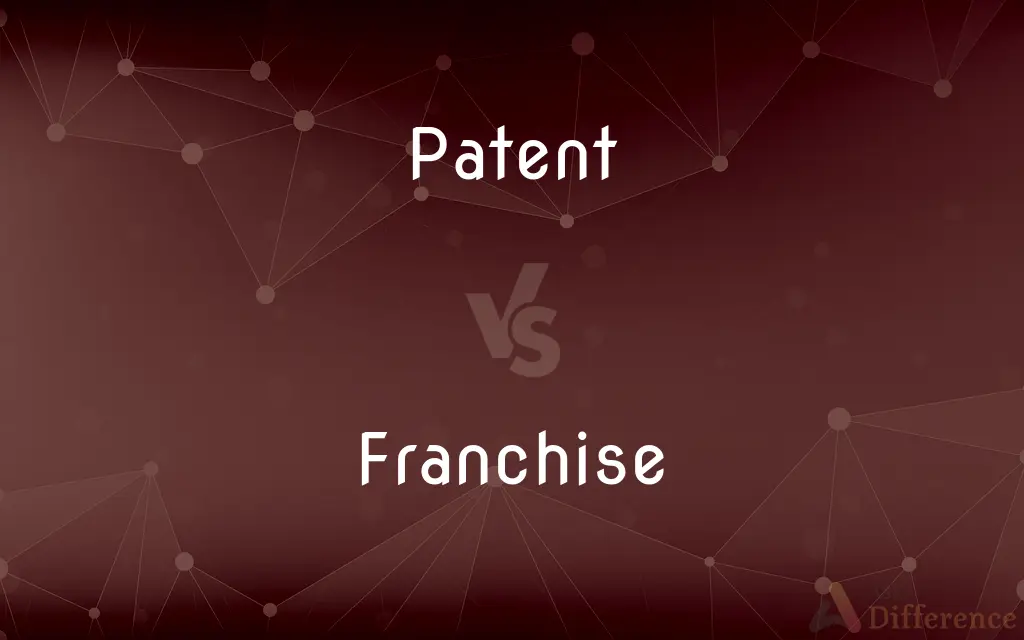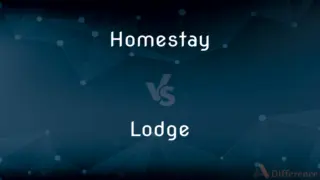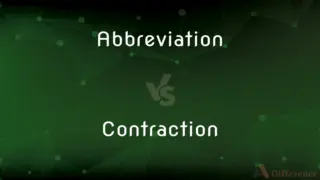Patent vs. Franchise — What's the Difference?
By Tayyaba Rehman & Urooj Arif — Updated on April 16, 2024
A patent is a legal right to exclude others from making or selling an invention, whereas a franchise is a business model where one party allows another to operate under its brand.

Difference Between Patent and Franchise
Table of Contents
ADVERTISEMENT
Key Differences
A patent grants an inventor exclusive rights to manufacture, use, or sell an invention for a certain period, typically 20 years, while a franchise involves a franchisor granting a franchisee the right to operate a business under its brand and system.
Patents are concerned with the protection of innovations and ideas, ensuring that inventors can profit from their inventions without competition, whereas franchises focus on expanding a business model and brand presence through partnerships with other business operators.
The process of obtaining a patent involves submitting detailed information about the invention to a patent office, which must demonstrate novelty and non-obviousness. In contrast, establishing a franchise requires legal agreements that define the terms of brand usage, business practices, and financial arrangements.
While patent holders may or may not choose to manufacture or sell their invention, a franchisee is actively involved in the day-to-day operations of the franchised business, utilizing the franchisor’s trademark, guidance, and business formula.
In terms of legal protection, patents defend against unauthorized use of an invention, and franchise agreements protect the franchisor’s brand and operational model while ensuring adherence to their system by the franchisee.
ADVERTISEMENT
Comparison Chart
Definition
Legal right to an invention
License to operate under a brand
Primary Concern
Protection of innovations
Business expansion
Duration
Typically 20 years
Varies, often 5-20 years
Legal Requirement
Novelty, non-obviousness, utility
Contract, brand consistency
Involvement
No requirement to commercialize
Active business operation
Compare with Definitions
Patent
Legal right granted for an invention.
He obtained a patent for his new solar panel technology.
Franchise
Involves following specific operational guidelines.
The franchisee must adhere to the franchisor's business model and store layout.
Patent
Typically lasts for a limited time period.
Once the patent expires, the invention can be freely manufactured by others.
Franchise
Often involves a fee or royalty payments.
The franchisee pays monthly royalties based on revenue.
Patent
Exclusive control over making, using, or selling an invention.
The company held a patent on the drug for twenty years.
Franchise
Includes use of trademarks and business systems.
Her franchise agreement allowed her to use the brand's trademark and recipes.
Patent
Protection from unauthorized commercial use.
Her patent prevented competitors from copying her design.
Franchise
Aims to replicate a successful business formula.
The franchise model enabled rapid expansion across multiple regions.
Patent
Issued by a governmental patent office.
The patent was issued after a rigorous examination process.
Franchise
A license to operate a business under a recognized brand.
He opened his own coffee shop under a national franchise.
Patent
A patent is a type of intellectual property that gives its owner the legal right to exclude others from making, using, or selling an invention for a limited period of years, in exchange for publishing an enabling public disclosure of the invention. In most countries, patent rights fall under private law and the patent holder must sue someone infringing the patent in order to enforce his or her rights.
Franchise
A privilege or right granted by law, especially the right to vote in the election of public officials.
Patent
A government authority or licence conferring a right or title for a set period, especially the sole right to exclude others from making, using, or selling an invention
He took out a patent for an improved steam hammer
Franchise
A special privilege given by government to a corporation or an individual to engage in a particular activity using public facilities, especially to provide a public service such as transportation or communications.
Patent
Patent leather
Designs in a wide range of textures featuring super-chic patent, soft suede, or sophisticated nappa
He wore black trousers and black patent shoes
Franchise
The establishment of a corporation, including the granting of certain privileges such as exemption from individual liability for the acts of the corporation.
Patent
Easily recognizable; obvious
She was smiling with patent insincerity
Franchise
Authorization granted to someone to sell or distribute a company's goods or services in a certain area.
Patent
(of a vessel, duct, or aperture) open and unobstructed; failing to close
The patient is usually left with a patent vessel
Franchise
A business or group of businesses established or operated under such authorization.
Patent
Made and marketed under a patent; proprietary
Patent milk powder
Franchise
A brand name under which a series of products is released.
Patent
Obtain a patent for (an invention)
An invention is not your own until it is patented
Franchise
The territory or limits within which immunity, a privilege, or a right may be exercised.
Patent
A grant made by a government that confers upon the creator of an invention the sole right to make, use, and sell that invention for a set period of time.
Franchise
A professional sports team.
Patent
Letters patent.
Franchise
To grant a franchise to.
Patent
An invention protected by such a grant.
Franchise
The right to vote at a public election or referendum; see: suffrage, suffragette.
Patent
A grant of publicly owned land, particularly to a homesteader.
Franchise
A right or privilege officially granted to a person, a group of people, or a company by a government.
Patent
The official document of such a grant.
Franchise
An acknowledgment of a corporation's existence and ownership.
Patent
The land so granted.
Franchise
The authorization granted by a company to sell or distribute its goods or services in a certain area.
McDonald’s has exported its franchise.
Patent
An exclusive right or title.
Franchise
A business operating under such authorization, a franchisee.
Patent
Protected or conferred by a patent or letters patent
A patent right.
Franchise
A legal exemption from jurisdiction.
Patent
Of, relating to, or dealing in patents
Patent law.
Franchise
The membership of a corporation or state; citizenship.
Patent
(also pātnt) Obvious; plain
A patent injustice.
Franchise
The district or jurisdiction to which a particular privilege extends; the limits of an immunity; hence, an asylum or sanctuary.
Patent
Not blocked; open
A patent duct.
Franchise
(sports) The collection of organizations in the history of a sports team; the tradition of a sports team as an entity, extending beyond the contemporary organization.
The Whalers' home city of Hartford was one of many for the franchise.
Patent
Spreading open; expanded
Patent sepals.
Franchise
The positive influence on the buying behavior of customers exerted by the reputation of a company or a brand.
Patent
Relating to or being a nonprescription drug or other medical preparation that is protected by a trademark.
Franchise
The loose collection of fictional works pertaining to a particular fictional universe, including literary, film, or television series from various sources, generally when all authorized by a copyright holder or similar authority.
The Star Wars franchise
Patent
Of high quality. Used of flour.
Franchise
Exemption from constraint or oppression; freedom; liberty.
Patent
To obtain a patent on or for (an invention, for example).
Franchise
(obsolete) Magnanimity; generosity; liberality; frankness; nobility.
Patent
To invent, originate, or be the proprietor of (an idea, for example).
Franchise
(transitive) To confer certain powers on; grant a franchise to; authorize.
Patent
To grant a patent to or for.
Franchise
To set free; invest with a franchise or privilege; enfranchise.
Patent
(law)
Franchise
Exemption from constraint or oppression; freedom; liberty.
Patent
An official document granting an appointment, privilege, or right, or some property or title; letters patent.
Franchise
A particular privilege conferred by grant from a sovereign or a government, and vested in individuals; an immunity or exemption from ordinary jurisdiction; a constitutional or statutory right or privilege, esp. the right to vote.
Election by universal suffrage, as modified by the Constitution, is the one crowning franchise of the American people.
Patent
(specifically)
Franchise
The district or jurisdiction to which a particular privilege extends; the limits of an immunity; hence, an asylum or sanctuary.
Churches and mobasteries in Spain are franchises for criminals.
Patent
A specific grant of ownership of a piece of real property; a land patent.
Franchise
Magnanimity; generosity; liberality; frankness; nobility.
Patent
(by extension) A product in respect of which a patent (sense 1.2.2) has been obtained.
Franchise
To make free; to enfranchise; to give liberty to.
Patent
(uncountable) shoes]]
Franchise
An authorization to sell a company's goods or services in a particular place
Patent
(figuratively)
Franchise
A business established or operated under an authorization to sell or distribute a company's goods or services in a particular area
Patent
A licence or (formal) permission to do something.
Franchise
A statutory right or privilege granted to a person or group by a government (especially the rights of citizenship and the right to vote)
Patent
A characteristic or quality that one possesses; in particular (hyperbolic) as if exclusively; a monopoly.
Franchise
Grant a franchise to
Patent
(gambling) The combination of seven bets on three selections, offering a return even if only one bet comes in.
Patent
To (successfully) register (a new invention) with a government agency to obtain the sole privilege of its manufacture, sale, and use for a specified period.
Patent
To obtain (over a piece of real property) a specific grant of ownership.
Patent
To be closely associated or identified with (something); to monopolize.
Patent
Conspicuous; open; unconcealed.
Patent
(baking) Of flour: fine, and consisting mostly of the inner part of the endosperm of the grain from which it is milled.
Patent
(medicine) Open, unobstructed; specifically, especially of the ductus arteriosus or foramen ovale in the heart, having not closed as would have happened in normal development.
She has a patent ductus arteriosus that will require surgery to close.
Patent
Of an infection: in the phase when the organism causing it can be detected by clinical tests.
Patent
Explicit and obvious.
Those claims are patent nonsense.
Patent
(archaic)
Patent
Especially of a document conferring some privilege or right: open to public perusal or use.
Letters patent
Patent
Appointed or conferred by letters patent.
Patent
(botany) Of a branch, leaf, etc.: outspread; also, spreading at right angles to the axis.
Patent
(law) Protected by a legal patent.
A patent right
Patent medicines
Patent
To which someone has, or seems to have, a claim or an exclusive claim; also, inventive or particularly suited for.
Patent
Open; expanded; evident; apparent; unconcealed; manifest; public; conspicuous.
He had received instructions, both patent and secret.
Patent
Open to public perusal; - said of a document conferring some right or privilege; as, letters patent. See Letters patent, under 3d Letter.
Patent
Appropriated or protected by letters patent; secured by official authority to the exclusive possession, control, and disposal of some person or party; patented; as, a patent right; patent medicines.
Madder . . . in King Charles the First's time, was made a patent commodity.
Patent
Spreading; forming a nearly right angle with the steam or branch; as, a patent leaf.
Patent
A letter patent, or letters patent; an official document, issued by a sovereign power, conferring a right or privilege on some person or party.
Four other gentlemen of quality remained mentioned in that patent.
Patent
The right or privilege conferred by such a document; hence, figuratively, a right, privilege, or license of the nature of a patent.
If you are so fond over her iniquity, give her patent to offend.
Patent
To grant by patent; to make the subject of a patent; to secure or protect by patent; as, to patent an invention; to patent public lands.
Patent
A document granting an inventor sole rights to an invention
Patent
An official document granting a right or privilege
Patent
Obtain a patent for;
Should I patent this invention?
Patent
Grant rights to; grant a patent for
Patent
Make open to sight or notice;
His behavior has patented an embarrassing fact about him
Patent
(of a bodily tube or passageway) open; affording free passage;
Patent ductus arteriosus
Patent
Clearly apparent or obvious to the mind or senses;
The effects of the drought are apparent to anyone who sees the parched fields
Evident hostility
Manifest disapproval
Patent advantages
Made his meaning plain
It is plain that he is no reactionary
In plain view
Common Curiosities
How long does a patent last?
Patents typically last for 20 years from the filing date of the patent application.
What is a franchise agreement?
A franchise agreement is a legal document that outlines the rights and obligations of the franchisor and the franchisee.
Can anyone buy a franchise?
Buying a franchise typically requires meeting the franchisor’s financial and operational criteria.
Can a patent be sold or licensed?
Yes, patents can be sold or licensed to others, providing another way to monetize the invention.
What is required to obtain a patent?
An invention must be new, non-obvious, and useful to qualify for a patent.
Is a patent necessary before selling an invention?
While not necessary, having a patent prevents others from making or selling the invention without permission.
What is a patent used for?
A patent is used to protect new inventions, allowing the holder exclusive rights to benefit from their creation.
What types of businesses can be franchised?
Almost any type of business can be franchised if it has a proven business model and brand value.
What support does a franchisee typically receive?
A franchisee typically receives training, operational support, and marketing from the franchisor.
Can patents be renewed?
Patents cannot be renewed once they expire; however, improvements or modifications can be separately patented.
Do patents apply internationally?
Patents are territorial and only provide protection within the country or region in which they are granted.
What are common fees involved in franchising?
Common fees include initial franchise fees, ongoing royalties, and advertising fees.
How does a franchise benefit the franchisor?
The franchisor benefits from expanded brand presence and revenue through franchise fees and royalties.
What happens when a patent expires?
When a patent expires, the protected invention enters the public domain, allowing anyone to make, use, or sell it.
What are the risks of buying a franchise?
Risks include potential high initial costs, strict operational controls, and dependency on the franchisor’s business stability.
Share Your Discovery

Previous Comparison
Homestay vs. Lodge
Next Comparison
Abbreviation vs. ContractionAuthor Spotlight
Written by
Tayyaba RehmanTayyaba Rehman is a distinguished writer, currently serving as a primary contributor to askdifference.com. As a researcher in semantics and etymology, Tayyaba's passion for the complexity of languages and their distinctions has found a perfect home on the platform. Tayyaba delves into the intricacies of language, distinguishing between commonly confused words and phrases, thereby providing clarity for readers worldwide.
Co-written by
Urooj ArifUrooj is a skilled content writer at Ask Difference, known for her exceptional ability to simplify complex topics into engaging and informative content. With a passion for research and a flair for clear, concise writing, she consistently delivers articles that resonate with our diverse audience.
















































